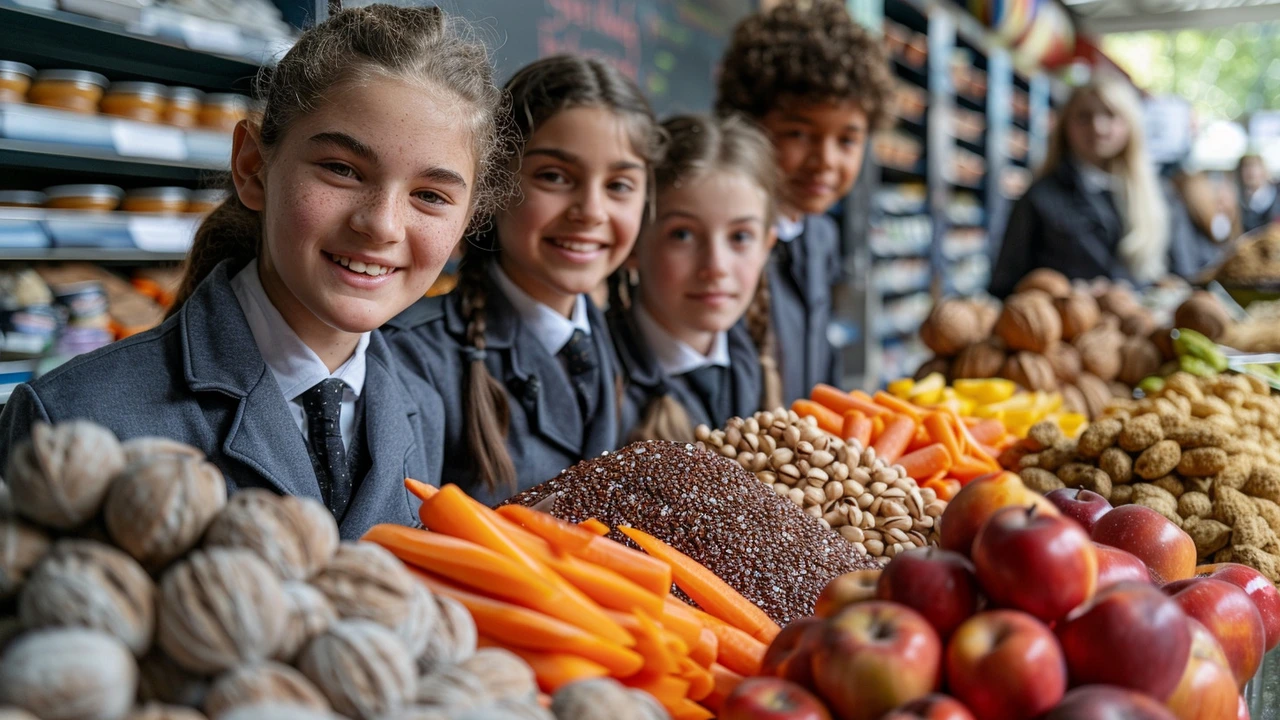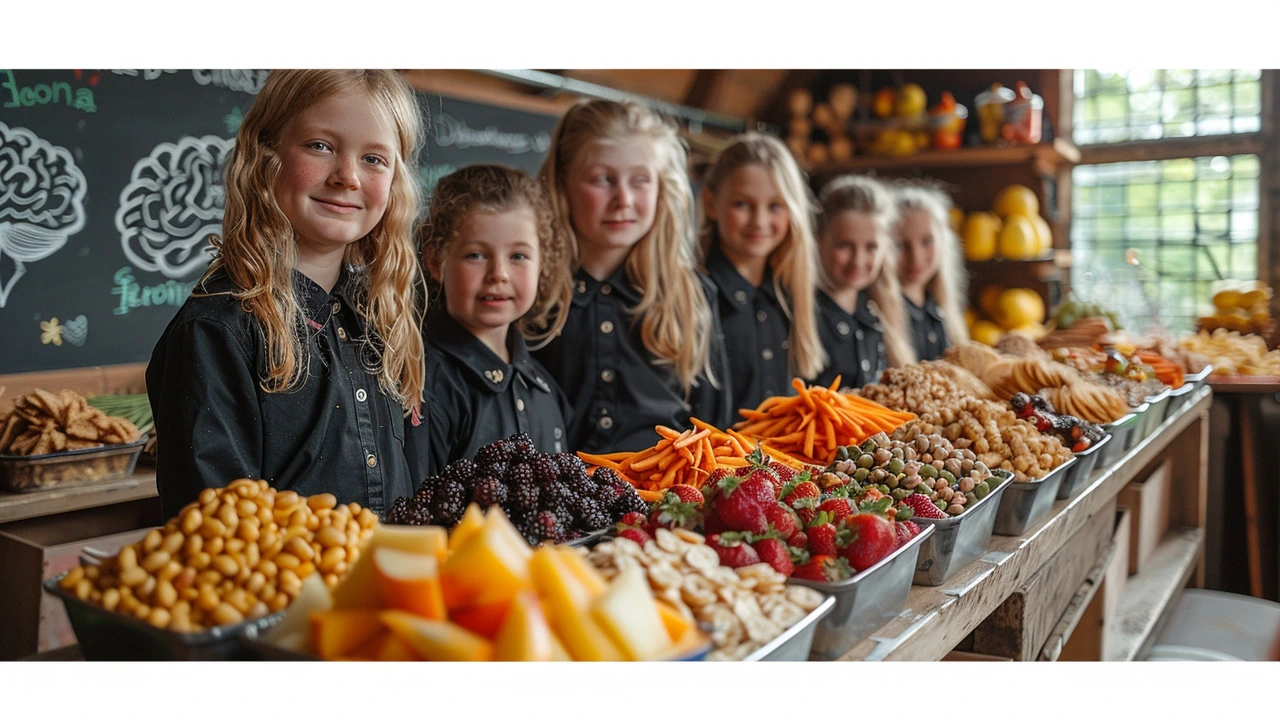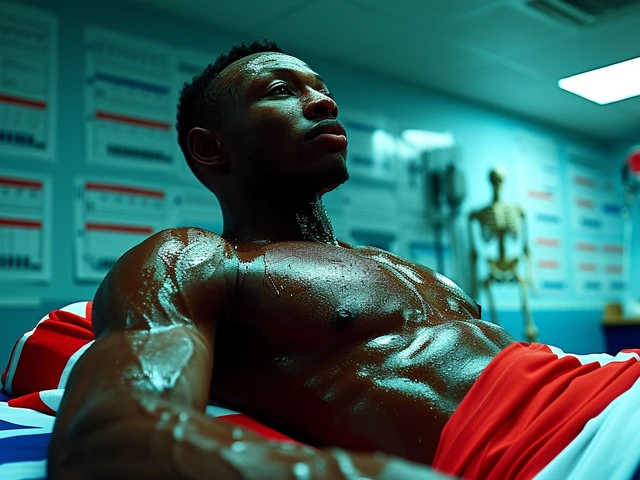Students have a lot on their plates—literally and figuratively! Ensuring they have the right snacks can make a huge difference in their energy levels and concentration. Healthy snacks are not just filler; they are essential for powering up the brain and achieving academic success.
Choosing nutritious snacks over sugary or processed foods helps provide the steady energy required for long study sessions and classes. It's not just about what tastes good; it's about what fuels our brains effectively. Simple, whole foods can be easy to prepare and incredibly beneficial.
In this article, we will dive into why healthy snacks matter, provide some tasty brain-boosting ideas, and break down the nutritional benefits. We'll also share some easy recipes and smart snacking tips so students can thrive both in and out of school.
- Why Healthy Snacks Matter
- Best Brain-Boosting Snack Ideas
- Nutritional Benefits of Each Snack
- Simple Recipes for Busy Students
- Tips for Smart Snacking Habits
Why Healthy Snacks Matter
Students often juggle various activities, from attending classes to participating in extracurriculars, and studying. In this shifting landscape, nutrition can sometimes take a backseat. But the truth is, healthy snacks play a crucial role in supporting a student's brain function, energy levels, and overall health. The brain consumes about 20% of the body's energy, so supplying it with the right fuel is vital.
Imagine trying to focus on a lecture or a study session after consuming a sugary snack; you may experience a quick burst of energy followed by a sudden crash. Such fluctuations can hinder cognitive performance and make concentration difficult. On the other hand, healthy snacks like nuts, fruits, and whole grains provide sustained energy release that keeps the brain engaged and alert.
A fascinating fact is that certain nutrients have a direct impact on cognitive abilities. Omega-3 fatty acids, found in foods like flaxseeds and walnuts, are essential for brain health. They improve memory and cognitive function. Similarly, vitamins such as B6, B12, and folate, found in leafy greens and fortified cereals, are linked to improved mental clarity and focus. Hydration is another key aspect, as even mild dehydration can impair short-term memory and attention.
As Dr. John Ratey, an associate clinical professor of psychiatry at Harvard Medical School, mentions, "Exercise and proper diet enhance mental capabilities more effectively than any pill." This highlights the importance of maintaining a healthy diet alongside other good practices.
Healthy snacks also help to avoid the mid-day slump that many students experience. Foods rich in fiber, such as apples and carrots, keep blood sugar levels stable. Fiber slows down digestion, which ensures a steady release of glucose into the bloodstream, keeping energy levels consistent. Additionally, protein-rich snacks like yogurt and cheese sticks aid in maintaining muscle mass and body strength, which is especially important for active students.
Moreover, choosing healthy snacks can positively influence mood and emotional well-being. Studies have shown that foods rich in antioxidants and anti-inflammatory compounds, like berries and dark chocolate, can reduce symptoms of depression and anxiety. This nutritional support enables students to better handle academic pressures and social interactions.
Snack Smart, Study Smart
Incorporating healthy snacks into daily routines doesn’t have to be time-consuming or expensive. Simple choices, like swapping a bag of chips for a handful of almonds, can make a significant difference. Parents and educators can also play a role by promoting snack options that are both tasty and nutritious. Pre-packaging snacks in small portions can make it easier for students to grab and go, ensuring they always have a healthy option on hand.
Healthy snacks matter because they provide essential nutrients, maintain energy levels, support cognitive functions, and positively impact mood. By making smarter snack choices, students can enhance their academic performance and overall well-being. Keep reading to discover some of the best brain-boosting snack ideas and ways to incorporate them into a busy student's lifestyle.

Best Brain-Boosting Snack Ideas
When it comes to fueling your brain, choosing the right snacks can make a big difference. Not all snacks are created equal, and some foods provide more benefits for brain power than others. Let’s dive into some of the best brain-boosting snacks you can incorporate into your routine.
First up, we have nuts and seeds. Almonds, walnuts, and pumpkin seeds are packed with omega-3 fatty acids, which are crucial for brain function. These tiny powerhouses are also rich in antioxidants, helping protect brain cells from damage. If you’re looking for a quick and easy snack, grab a handful of nuts or sprinkle some seeds on your yogurt.
Another excellent option is berries. Blueberries, strawberries, and blackberries are not only delicious but also fantastic for brain health. These fruits are high in flavonoids, compounds that have been shown to improve cognitive function. They’re also a great source of vitamins, particularly vitamin C, which helps keep your immune system strong. Add berries to your cereal or enjoy them as a fresh, sweet treat.
Dark chocolate is another surprising superstar when it comes to brain-boosting snacks. Rich in flavonoids, dark chocolate can enhance memory and mood. The key is to choose chocolate with at least 70% cocoa content to reap the maximum benefits. Enjoy a small piece of dark chocolate to satisfy your sweet tooth while giving your brain a little boost.
For a savory option, consider avocado toast. Avocados are loaded with healthy fats that support brain health, and they’re also high in vitamin K and folate. These nutrients help improve cognitive function and prevent blood clots in the brain. Spread some mashed avocado on whole-grain toast for a snack that’s both satisfying and nutritious.
Greek yogurt with honey and nuts is another great brain-boosting snack. Greek yogurt is rich in protein and probiotics, which promote healthy gut bacteria—a factor linked to improved brain function. Adding honey and nuts not only enhances the flavor but also provides additional nutrients that support cognitive health. This combination makes for a creamy, crunchy, and nutritious snack.
Eggs are another versatile and brain-friendly food. They’re an excellent source of choline, a nutrient that helps produce acetylcholine, a neurotransmitter involved in memory and learning. Hard-boiled eggs are an easy and portable snack that can keep you full and focused throughout the day.
Oatmeal is more than just a breakfast staple. It’s a whole grain that provides a steady release of energy, essential for maintaining concentration and focus during long study sessions. Top your oatmeal with fruits and nuts for an added brain boost.
According to Dr. David Perlmutter, a board-certified neurologist and author of 'Grain Brain,' 'Food is medicine, and dietary changes can have a profound impact on brain function.'
Lastly, let’s not forget about hummus and vegetables. Hummus is made from chickpeas, which are high in protein and fiber—both crucial for maintaining steady energy levels. Pairing hummus with fresh veggies like carrots, celery, and bell peppers adds a dose of vitamins and crunch.
By incorporating these brain-boosting snacks into your diet, you'll be supporting your cognitive health and enhancing your study sessions. Snack smart and stay sharp!

Nutritional Benefits of Each Snack
When it comes to snacking, not all options are created equal. Some snacks provide essential vitamins and minerals that directly support brain function, energy levels, and overall well-being. Here, we’ll explore the nutritional benefits of some top-tier snacks that can help students feel their best during study sessions.
First up is almonds. These little nuts are packed with vitamin E, which is known to protect the brain from cognitive decline. They also contain magnesium, a mineral that helps with brain function and mood regulation. Eating a handful of almonds while studying can provide a steady release of energy, perfect for long periods of concentration.
Blueberries are another fantastic option. Often termed “brain berries,” they are rich in antioxidants, specifically anthocyanins, which improve communication between brain cells and delay brain aging. Studies have shown that regular consumption of blueberries can help boost memory and cognitive functioning.
Greek yogurt is a protein powerhouse that’s also filled with probiotics, promoting gut health, which in turn affects mental health. The high protein content helps to keep blood sugar levels stable, ensuring students stay focused without the distractions of hunger.
Catherine Jackson, a nutritionist, notes, “Including a variety of brain-boosting foods in your diet is essential. Greek yogurt offers a balanced mixture of fats and protein, making it a great snack option for sustained energy and mental clarity.”
Whole grain crackers paired with some cheese can make for a well-rounded snack. Whole grains are a vital source of complex carbohydrates, which the brain uses for fuel. Unlike simple carbs that cause quick spikes and drops in blood sugar, whole grains provide a slow and steady release of glucose into the bloodstream, aiding in sustained mental performance.
Adding some dark chocolate into the mix is not only a treat but a brain booster. Dark chocolate contains flavonoids, caffeine, and antioxidants, which together enhance memory, focus, and mood. Opt for dark chocolate that’s at least 70% cocoa for the most benefits.
Alongside these options, don’t forget about fruits and vegetables. Snacks like carrot sticks, apple slices, or a bowl of mixed fresh fruits can deliver an array of vitamins, minerals, and fiber that support overall health and brain function. The natural sugars found in fruits provide a quick energy boost without the crash that comes from processed snacks.
Sample Snack Combinations
Creating balance in your snacks is key. Here are some combo ideas that blend taste and nutrition effectively:
- Almonds with dried cranberries.
- Sliced apples with a dollop of almond butter.
- Greek yogurt with a handful of granola and blueberries.
- Whole grain crackers with cheese and cherry tomatoes.
- Dark chocolate squares with orange segments.
By incorporating these snacks into their daily routine, students can help ensure they’re not just feeding their bodies, but also fueling their minds. It's all about making smart choices that are easy to prepare and delicious too!

Tips for Smart Snacking Habits
Smart snacking is all about making informed choices that benefit both your mind and body. Knowing what to eat and when to eat can significantly affect a student's focus and energy levels throughout the day. Here are several practical tips to help you snack smarter:
1. Always keep your snacks balanced. A good mix of protein, healthy fats, and carbohydrates will keep your energy levels stable and prevent those dreaded midday crashes. For example, pair an apple with some almond butter or a handful of nuts with a piece of cheese. Balance is key to maintaining sustained energy and concentration.
2. Portion control is crucial. While it might be tempting to munch on a family-size bag of chips, it's essential to stick to reasonable portions. Overeating can lead to sluggishness and make it difficult to concentrate. Consider using small containers or snack-sized bags to help manage portions better.
3. Make your snacks ahead of time. Preparing snacks in advance can save you from reaching for unhealthy options when you're in a rush. Invest a little time over the weekend to cut veggies, portion out nuts, or make some homemade energy bars. This way, you’ll have easy access to nutritious options when hunger strikes.
4. Stay hydrated. Sometimes, what we perceive as hunger is actually thirst. Drinking plenty of water can help you avoid unnecessary snacking and keep your mind sharp. Try to carry a water bottle with you and sip throughout the day. Herbal teas or water infused with fruits can also be excellent choices.
5. Listen to your body. It's important to eat when you're genuinely hungry, not out of boredom or stress. Learning to recognize the difference can help you avoid unnecessary snacking and maintain a healthy relationship with food. Practice mindful eating by paying attention to your hunger cues and eating slowly to savor each bite.
6. Choose whole foods over processed options. Whole foods like fruits, vegetables, nuts, and seeds are packed with nutrients and free from the added sugars and unhealthy fats found in many processed snacks. These natural options will provide sustained energy and support overall health.
7. Read labels carefully. When choosing packaged snacks, take a moment to read the nutrition labels. Look out for hidden sugars, unhealthy fats, and artificial ingredients that can sabotage your healthy eating efforts. The fewer ingredients, the better.
8. Incorporate brain-boosting foods. Foods rich in omega-3 fatty acids, antioxidants, and vitamins are particularly beneficial for cognitive function. Incorporate snacks like walnuts, blueberries, and dark chocolate to give your brain an extra boost.
9. Time your snacks wisely. Eating the right snacks at the right times can keep your energy levels steady. Opt for lighter snacks mid-morning and mid-afternoon to maintain focus and avoid energy dips. Avoid heavy or sugary snacks close to study sessions or bedtime, as they can disrupt concentration and sleep.
10. Enjoy your snacks. Choose snacks you enjoy and look forward to eating. The experience should be satisfying and pleasant, which will make it easier to stick with healthy choices. Experiment with different combinations to keep things interesting and delicious.
According to Dr. Lisa Young, a nutritionist, "Mindful eating and balanced snacks can make a significant difference in energy levels and concentration, especially for students with demanding schedules."






Write a comment: